Unit5 Do you have a soccer ball单元复习课件
文档属性
| 名称 | Unit5 Do you have a soccer ball单元复习课件 | 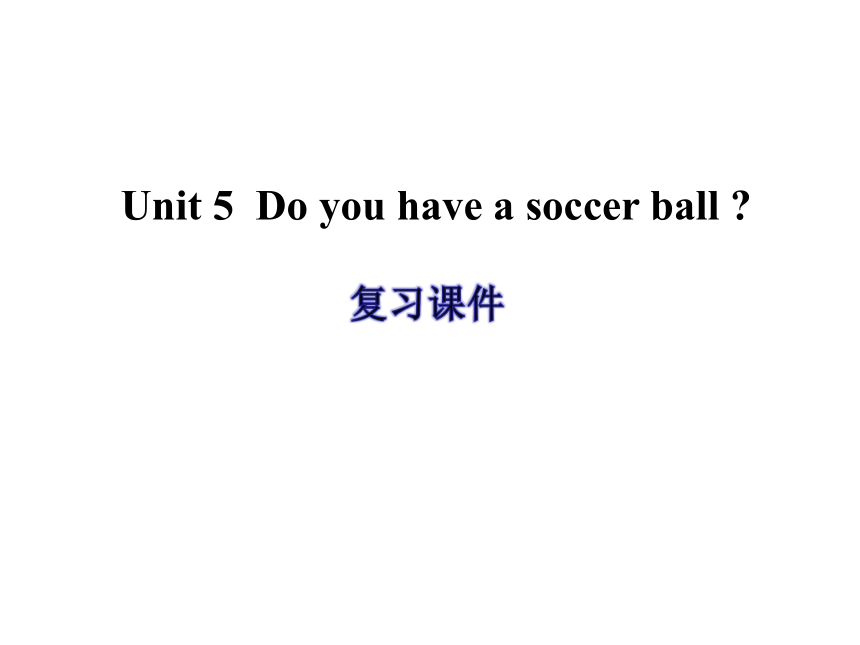 | |
| 格式 | zip | ||
| 文件大小 | 891.4KB | ||
| 资源类型 | 教案 | ||
| 版本资源 | 人教新目标(Go for it)版 | ||
| 科目 | 英语 | ||
| 更新时间 | 2016-11-17 21:38:03 | ||
图片预览

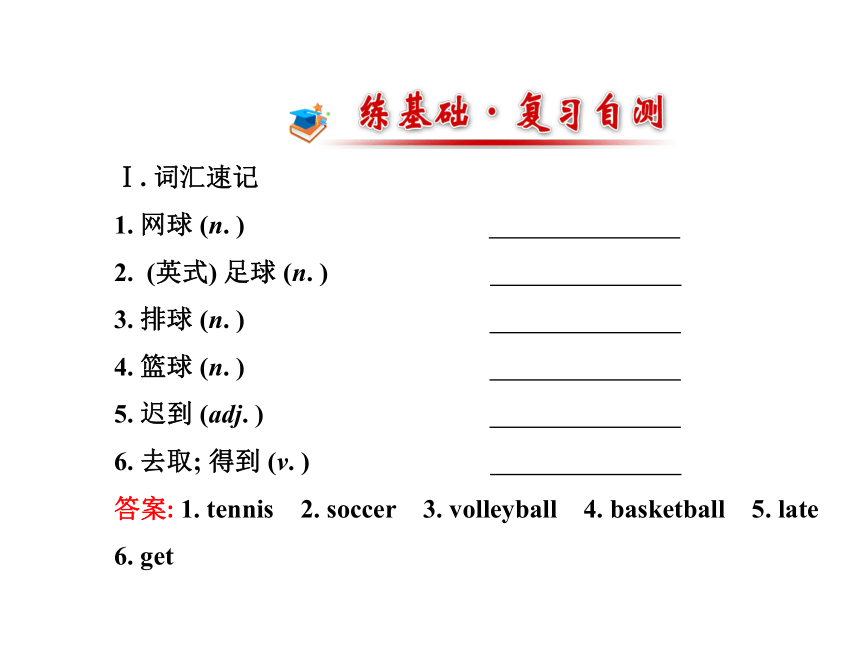
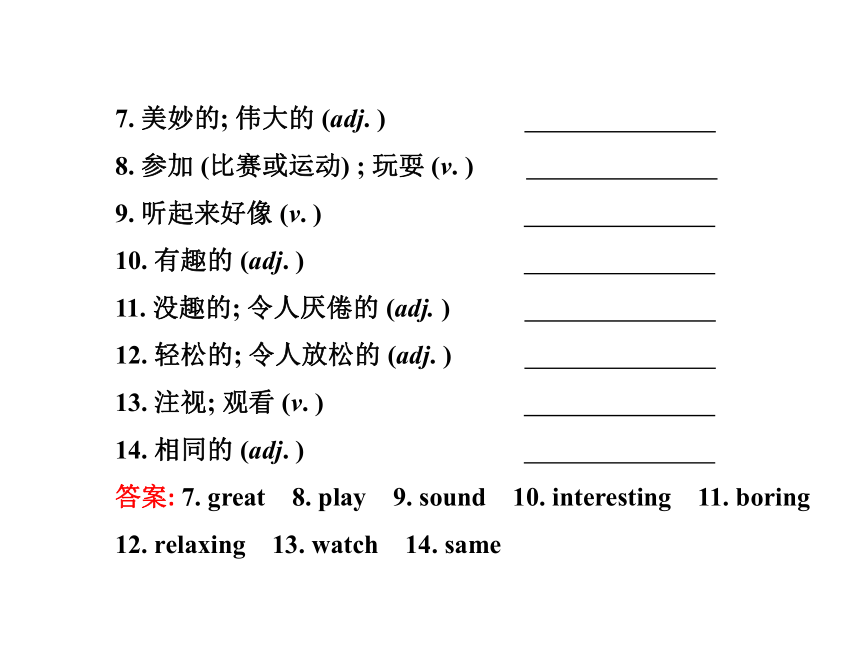
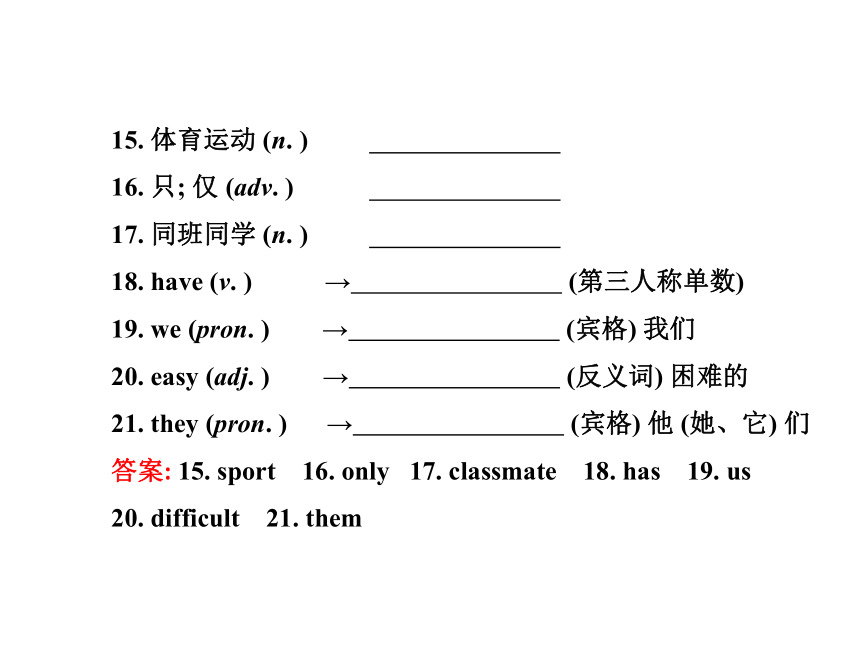
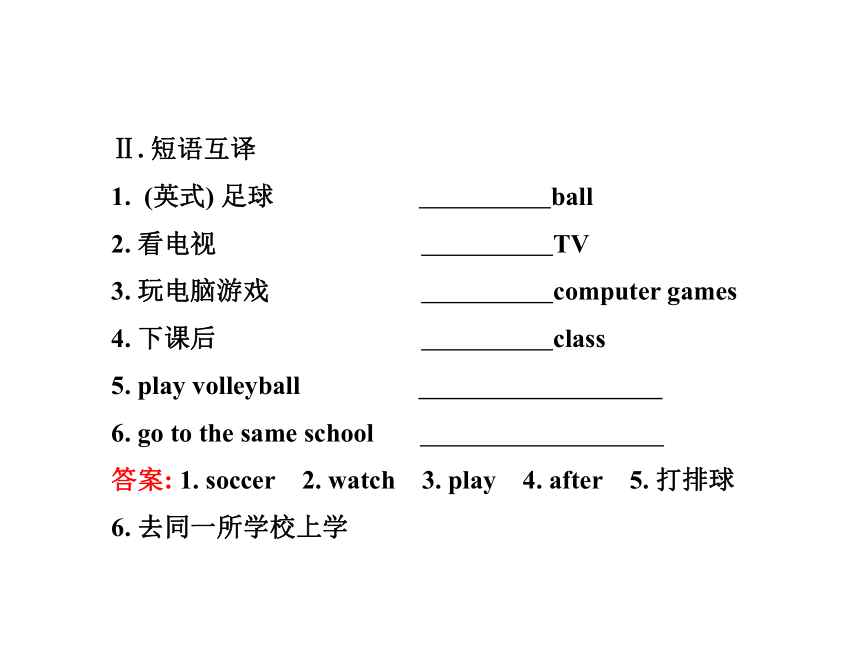
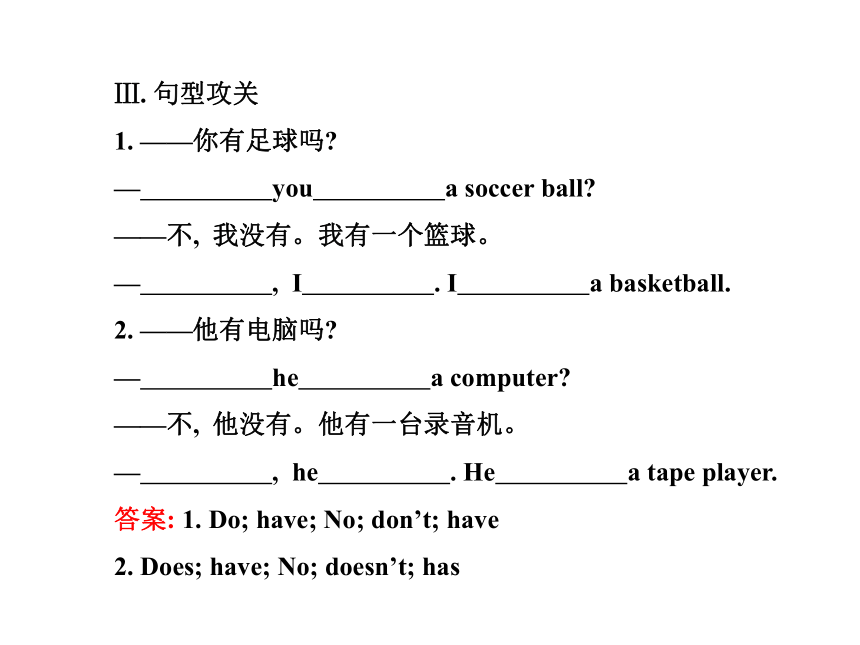
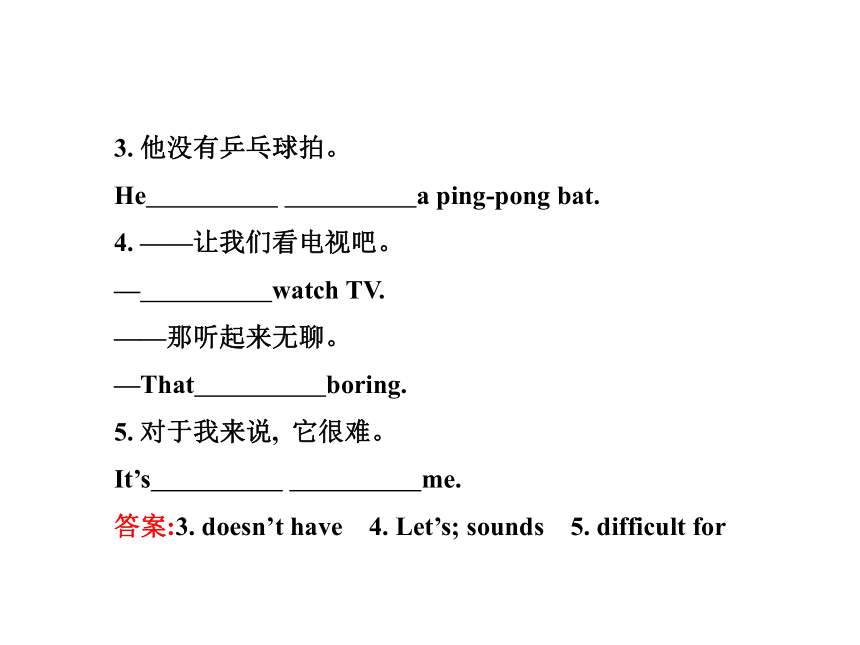
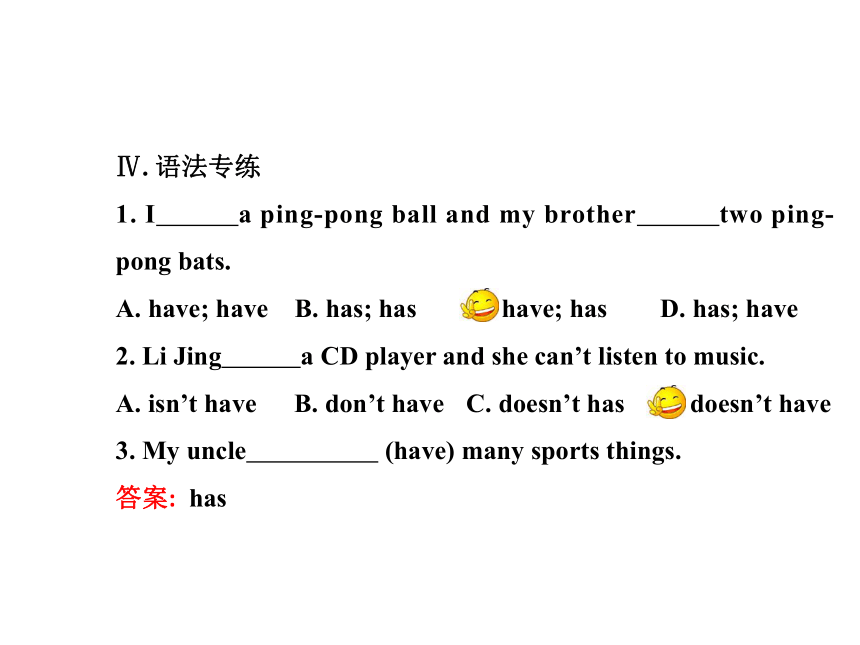
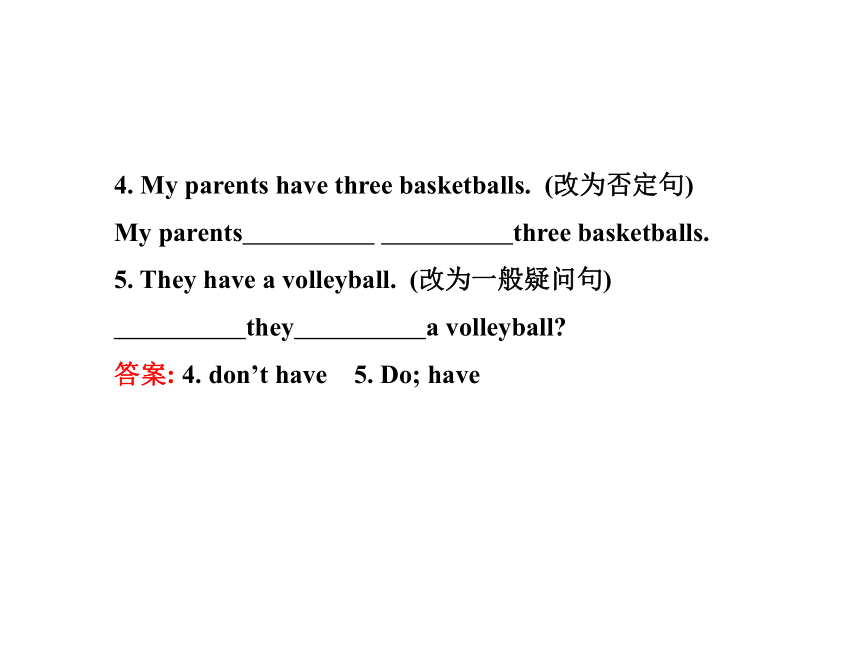
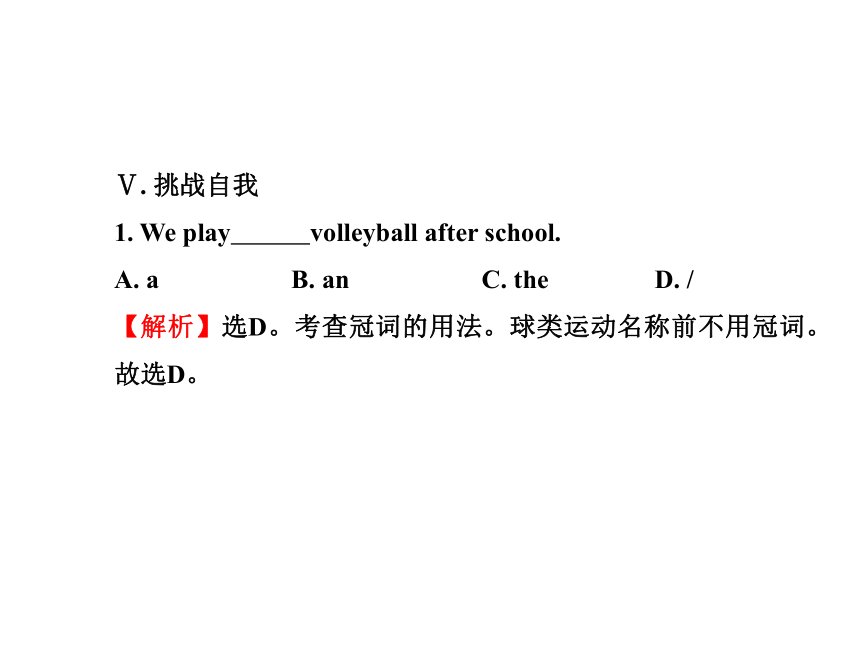
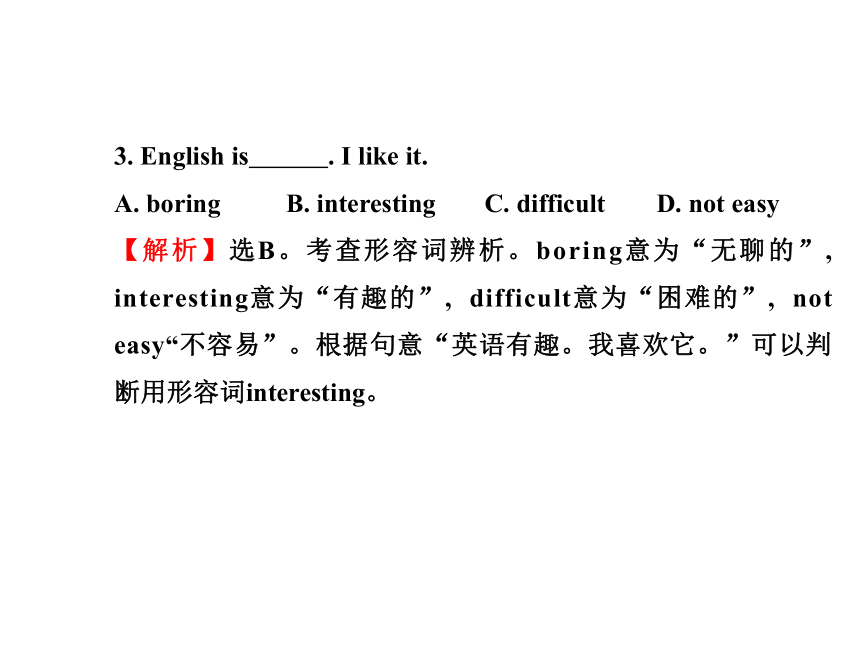
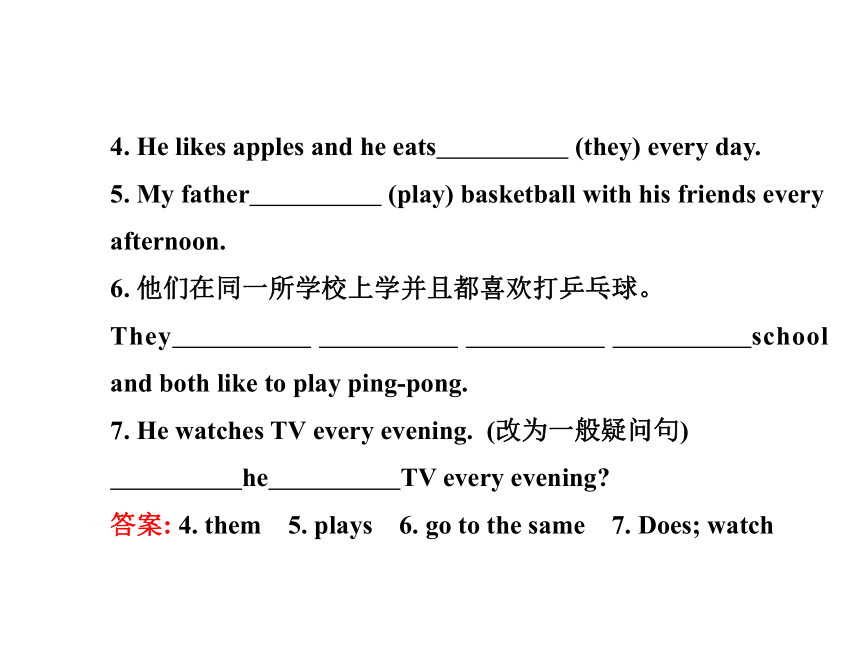
文档简介
课件46张PPT。复习课件 Unit 5 Do you have a soccer ball ?Ⅰ. 词汇速记
1. 网球 (n. ) ?
2. (英式) 足球 (n. ) ?
3. 排球 (n. ) ?
4. 篮球 (n. ) ?
5. 迟到 (adj. ) ?
6. 去取; 得到 (v. ) ?
答案: 1. tennis 2. soccer 3. volleyball 4. basketball 5. late
6. get 7. 美妙的; 伟大的 (adj. ) ?
8. 参加 (比赛或运动) ; 玩耍 (v. ) ?
9. 听起来好像 (v. ) ?
10. 有趣的 (adj. ) ?
11. 没趣的; 令人厌倦的 (adj. ) ?
12. 轻松的; 令人放松的 (adj. ) ?
13. 注视; 观看 (v. ) ?
14. 相同的 (adj. ) ?
答案: 7. great 8. play 9. sound 10. interesting 11. boring
12. relaxing 13. watch 14. same 15. 体育运动 (n. ) ?
16. 只; 仅 (adv. ) ?
17. 同班同学 (n. ) ?
18. have (v. ) → (第三人称单数)
19. we (pron. ) → (宾格) 我们
20. easy (adj. ) → (反义词) 困难的
21. they (pron. ) → (宾格) 他 (她、它) 们
答案: 15. sport 16. only 17. classmate 18. has 19. us
20. difficult 21. themⅡ. 短语互译
1. (英式) 足球 ball
2. 看电视 TV
3. 玩电脑游戏 computer games
4. 下课后 class
5. play volleyball ?
6. go to the same school ?
答案: 1. soccer 2. watch 3. play 4. after 5. 打排球
6. 去同一所学校上学Ⅲ. 句型攻关
1. ——你有足球吗?
— you a soccer ball?
——不, 我没有。我有一个篮球。
— , I . I a basketball.
2. ——他有电脑吗?
— he a computer?
——不, 他没有。他有一台录音机。
— , he . He a tape player.
答案: 1. Do; have; No; don’t; have
2. Does; have; No; doesn’t; has3. 他没有乒乓球拍。
He a ping-pong bat.
4. ——让我们看电视吧。
— watch TV.
——那听起来无聊。
—That boring.
5. 对于我来说, 它很难。
It’s me.
答案:3. doesn’t have 4. Let’s; sounds 5. difficult forⅣ. 语法专练
1. I a ping-pong ball and my brother two ping-pong bats.
A. have; have B. has; has C. have; has D. has; have
2. Li Jing a CD player and she can’t listen to music.
A. isn’t have B. don’t have C. doesn’t has D. doesn’t have
3. My uncle (have) many sports things.
答案: has 4. My parents have three basketballs. (改为否定句)
My parents three basketballs.
5. They have a volleyball. (改为一般疑问句)
they a volleyball?
答案: 4. don’t have 5. Do; haveⅤ. 挑战自我
1. We play volleyball after school.
A. a B. an C. the D. /
【解析】选D。考查冠词的用法。球类运动名称前不用冠词。故选D。3. English is . I like it.
A. boring B. interesting C. difficult D. not easy
【解析】选B。考查形容词辨析。boring意为“无聊的”, interesting意为“有趣的”, difficult意为“困难的”, not easy“不容易”。根据句意“英语有趣。我喜欢它。”可以判断用形容词interesting。4. He likes apples and he eats (they) every day.
5. My father (play) basketball with his friends every afternoon.
6. 他们在同一所学校上学并且都喜欢打乒乓球。
They school and both like to play ping-pong.
7. He watches TV every evening. (改为一般疑问句)
he TV every evening?
答案: 4. them 5. plays 6. go to the same 7. Does; watchLanguage points(一)Do you have a ping-pong bat?
do的用法:
作助动词,无词义,帮助构成否定句或疑问句;在简略答语中,用do来代替原句中的实义动词;有时用于肯定句,目的是为了加强语气。肯定回答:Yes,主语(代词)+ do/does.
否定回答:No,主语(代词)+don’t/doesn’t.—Do you have a basketball?你们有一个篮球吗?
—Yes, we do./No, we don’t.
是的,我们有。/不,我们没有。动词have的用法
(1) have意为“有”, 强调“所属关系”, 其第三人称
单数形式是has。
(2) have为实义动词, 表示疑问或否定时常借助于助动
词do或does。have/has和there be结构
I have a computer. 我有一台电脑。
There is a book on the table. 桌子上有一本书。表示“有”时, 侧重于主观方面, 有“归……所有”的意思, 常用于“某人 (某物) 有……”的句型。表示“有”时, 侧重于客观存在, 常用于“某地 (某时) 有某人/某物”的句型, 至于此物属于谁则无关紧要。Ⅰ. 用所给单词的适当形式填空
1. —Where is the basketball?
—Let’s (ask) our teacher.
2. My brother (have) a soccer ball.
3. — you (have) a tennis bat?
—Yes, I do.
4. your sister (have) a computer game?
5. —Where (be) your ping-pong bat?
—In my schoolbag. Exercise askhasDohaveDoeshaveisⅡ. 单项选择
1. I a ping-pong ball and Bob two ping-pong bats.
A. have; have B. have; has
C. has; has D. has; have
2. Jim wants to play basketball, but he a basketball.
A. have B. has
C. don’t have D. doesn’t have3. — your sister have a volleyball?
—No, she .
A. Do; don’t B. Does; don’t
C. Does; doesn’t D. Do; doesn’t
4. My soccer ball under the bed. Let get it.
A. are; we B. are; me
C. is; we D. is; me5. — you a tennis ball?
—Yes, I do.
A. Do; have B. Do; has
C. Does; have D. Does; hasLanguage points(二)一般现在时中have 的用法 have意为“有; 拥有; 占有”, 表示所属关系, 有人称和数的变化, 其主语一般是人, 有时也可以是物。它的一般现在时的各种句式如下: 1. 肯定句: 主语+ have/has. . .
have用于复数名词、第一、二人称单复数或第三人称复数代词作主语的句子中; has为have的第三人称单数形式, 用于不可数名词、可数名词单数或第三人称单数代词作主语的句子中。
You have many good habits. 你有很多好习惯。
Tom has three baseballs. 汤姆有三个棒球。2. 否定句: 主语+ don’t / doesn’t + have. . .
We don’t have the key. 我们没有钥匙。
She doesn’t have a tennis racket. 她没有网球拍。3.一般疑问句:Do/Does+主语+have…??
肯定答语:Yes,主语+do/does.
否定答语:No,主语 +don't/doesn't.?
—Do you have a bike?你有自行车吗??
—Yes ,I do./No,I don’t.是的,我有。/不,我没有。①当have/has后的名词被some修饰时,在否定句和
疑问句中some一般要改为any。
Do you have any money?你有钱吗? ②have/has与 there be当“有”讲时的区别:
have/has与主语为所属关系,强调的是某人“拥有;占有”某物,主语一般为名词或代词;there be句型强调的是一种客现存在的事实,为there引导的倒装句。Ⅰ. 选择方框内合适的词填空
sounds, have, has, don’t, play
1. —Let’s go to the movies (看电影) .
—That great.
2. My grandfather a radio. He listens to it every day.
3. Tom and Jim a nice and big room.
4. —Let’s soccer.
—That’s OK.
5. —Do you have a ping-pong ball?
—No, I . soundshashaveplaydon’tExercise Ⅱ. 单项选择
1. —Let’s play volleyball.
—That sounds good.
A. the B. a C. an D. /
2. they a tape player?
A. Do; have B. Does; have
C. Are; have D. Do; has
3. —Does he have a baseball?
— But he has a baseball bat.
A. Yes, he does. B. Yes, he do.
C. No, he doesn’t. D. No, he don’t. 4. —Is this tennis racket (网球拍) ?
—Yes, it’s .
A. hers; her B. his; his
C. his; her D. your; hers
5. This is my volleyball and that tennis ball is .
A. brother; mine B. brother’s; mine
C. brother; my D. brother’s; myLanguage points(三) 1. That sounds interesting. 那听起来有趣。
(1) interesting形容词, 意为“有趣的”, 在句中可以作
定语, 也可以作表语。
(2) interesting, boring和relaxing都是由动词去e或直接
加-ing构成的形容词, 可用来作定语修饰物或事情,
或用来作表语描述某物或某事, 但一般不能修饰人
或描述人。【归纳拓展】
以-ed结尾的形容词
以-ed结尾的形容词多用来修饰或者描述人, 如interested, bored和relaxed。
We are relaxed by listening to relaxing music.
我们通过听轻松的音乐来放松。2. fun adj. 有趣的; 使人快乐的
n. 乐趣; 快乐 fun的用法
(1) fun作为形容词, 意为“有趣的; 使人快乐的”。
在句中作表语。
(2) 作为不可数名词, 意为“乐趣; 快乐”。have fun的用法
have fun意为“玩得高兴, 过得愉快”。
have fun doing sth. 意为“做某事高兴”。
They have fun watching TV.
他们看着电视过得很愉快。Ⅰ. 用所给词的适当形式填空
1. Let (I) get the hat for you.
2. Let’s (play) volleyball.
3. We (watch) TV on Sunday (星期日) .
4. Mike (have) a white model plane.
5. He (not play) ping-pong. Exercise meplaywatchhasdoesn’t playⅡ. 单项选择
1. My sister has volleyball and she likes to play ? volleyball very much.
A. the; the B. a; the C. a; / D. /; a
2. I like to watch TV. I think it’s .
A. interesting B. boring
C. difficult D. not fun3. —Where is your computer ?
— on the desk.
A. game; They are B. game; It is
C. games; They are D. games; It is
4. We can’t find schoolbags. Can you help ?
A. us; us B. we; us C. our; we D. our; us
5. —Do you watch TV every day?
— I think it’s boring.
A. Yes, I do. B. No, I don’t.
C. Yes, she does. D. No, she doesn’t. Language points(四) 1. same adj. 相同的
same为形容词, 意为“相同的; 同一的”。same前一般带定冠词the, 其后的名词用 (单数/复数) 。same的反义词为different, 意为“不同的”。different后面的名词则要用 (单数/复数) 。
They are in different classes. 他们在不同的班级。
单数复数2. It’s easy for me. 它对我来说很容易。
“It + be +形容词+for sb. (+ to do sth. ) ”为固定句型, 意为“对某人来说 (做某事) 是……的”, it是形式主语。
It’s difficult for me to play tennis.
对于我来说打网球难。
It’s relaxing to listen to music.
听音乐让人放松。3. We play it at school with our friends.
在学校里我们与朋友们一起踢足球。at school是介词短语,意为“在学校;在上学”。
school的常用短语有:
go to school 去上学
leave school 毕业;退学
after school 放学后
middle school 中学4. I only watch them on TV!我只在电视上看它们!人称代词主格与宾格对应一览表:Ⅰ. 用所给词的适当形式填空
1. I love soccer and basketball and I play (they)
every day.
2. It’s boring for me (watch) TV.
3. Gina has three (volleyball) . They are under
the desk.
4. Her sister and I (be) good friends.
5. he (play) tennis after school? themto watchvolleyballsareDoesplayExercise Ⅱ. 单项选择
1. I like to play computer games my cousin.
A. on B. with C. in D. under
2. He baseball.
A. don’t play B. doesn’t plays
C. doesn’t play D. not play3. My mother loves volleyball. She thinks (认为) it is .
A. fun B. boring C. difficult D. nice
4. I a baseball, my brother does.
A. don’t have; and B. don’t have; but
C. have; but D. doesn’t have; but
5. The girl is a Chinese (是中国人) . Ping-pong is easy ? her.
A. with B. on C. of D. for作文点拨假如你是王伟,请根据表格内信息,介绍你的朋友张鹏、李帅【思路点拨】
(1) 体裁: 说明文。 (2) 人称: 第一人称。
(3) 时态: 一般现在时。【参考范文】
My name is Wang Wei. I have two good friends. They are Zhang Peng and Li Shuai. We all like sports. I have three soccer balls and five basketballs. I like soccer because it’s relaxing. Zhang Peng has ten ping-pong balls and six ping-pong bats. He likes ping-pong. He thinks it’s easy for him. Li Shuai has five volleyballs, eight baseballs and seven tennis balls. He likes tennis. He thinks it’s difficult but interesting.
We all think sports are good for us. THANK YOU
1. 网球 (n. ) ?
2. (英式) 足球 (n. ) ?
3. 排球 (n. ) ?
4. 篮球 (n. ) ?
5. 迟到 (adj. ) ?
6. 去取; 得到 (v. ) ?
答案: 1. tennis 2. soccer 3. volleyball 4. basketball 5. late
6. get 7. 美妙的; 伟大的 (adj. ) ?
8. 参加 (比赛或运动) ; 玩耍 (v. ) ?
9. 听起来好像 (v. ) ?
10. 有趣的 (adj. ) ?
11. 没趣的; 令人厌倦的 (adj. ) ?
12. 轻松的; 令人放松的 (adj. ) ?
13. 注视; 观看 (v. ) ?
14. 相同的 (adj. ) ?
答案: 7. great 8. play 9. sound 10. interesting 11. boring
12. relaxing 13. watch 14. same 15. 体育运动 (n. ) ?
16. 只; 仅 (adv. ) ?
17. 同班同学 (n. ) ?
18. have (v. ) → (第三人称单数)
19. we (pron. ) → (宾格) 我们
20. easy (adj. ) → (反义词) 困难的
21. they (pron. ) → (宾格) 他 (她、它) 们
答案: 15. sport 16. only 17. classmate 18. has 19. us
20. difficult 21. themⅡ. 短语互译
1. (英式) 足球 ball
2. 看电视 TV
3. 玩电脑游戏 computer games
4. 下课后 class
5. play volleyball ?
6. go to the same school ?
答案: 1. soccer 2. watch 3. play 4. after 5. 打排球
6. 去同一所学校上学Ⅲ. 句型攻关
1. ——你有足球吗?
— you a soccer ball?
——不, 我没有。我有一个篮球。
— , I . I a basketball.
2. ——他有电脑吗?
— he a computer?
——不, 他没有。他有一台录音机。
— , he . He a tape player.
答案: 1. Do; have; No; don’t; have
2. Does; have; No; doesn’t; has3. 他没有乒乓球拍。
He a ping-pong bat.
4. ——让我们看电视吧。
— watch TV.
——那听起来无聊。
—That boring.
5. 对于我来说, 它很难。
It’s me.
答案:3. doesn’t have 4. Let’s; sounds 5. difficult forⅣ. 语法专练
1. I a ping-pong ball and my brother two ping-pong bats.
A. have; have B. has; has C. have; has D. has; have
2. Li Jing a CD player and she can’t listen to music.
A. isn’t have B. don’t have C. doesn’t has D. doesn’t have
3. My uncle (have) many sports things.
答案: has 4. My parents have three basketballs. (改为否定句)
My parents three basketballs.
5. They have a volleyball. (改为一般疑问句)
they a volleyball?
答案: 4. don’t have 5. Do; haveⅤ. 挑战自我
1. We play volleyball after school.
A. a B. an C. the D. /
【解析】选D。考查冠词的用法。球类运动名称前不用冠词。故选D。3. English is . I like it.
A. boring B. interesting C. difficult D. not easy
【解析】选B。考查形容词辨析。boring意为“无聊的”, interesting意为“有趣的”, difficult意为“困难的”, not easy“不容易”。根据句意“英语有趣。我喜欢它。”可以判断用形容词interesting。4. He likes apples and he eats (they) every day.
5. My father (play) basketball with his friends every afternoon.
6. 他们在同一所学校上学并且都喜欢打乒乓球。
They school and both like to play ping-pong.
7. He watches TV every evening. (改为一般疑问句)
he TV every evening?
答案: 4. them 5. plays 6. go to the same 7. Does; watchLanguage points(一)Do you have a ping-pong bat?
do的用法:
作助动词,无词义,帮助构成否定句或疑问句;在简略答语中,用do来代替原句中的实义动词;有时用于肯定句,目的是为了加强语气。肯定回答:Yes,主语(代词)+ do/does.
否定回答:No,主语(代词)+don’t/doesn’t.—Do you have a basketball?你们有一个篮球吗?
—Yes, we do./No, we don’t.
是的,我们有。/不,我们没有。动词have的用法
(1) have意为“有”, 强调“所属关系”, 其第三人称
单数形式是has。
(2) have为实义动词, 表示疑问或否定时常借助于助动
词do或does。have/has和there be结构
I have a computer. 我有一台电脑。
There is a book on the table. 桌子上有一本书。表示“有”时, 侧重于主观方面, 有“归……所有”的意思, 常用于“某人 (某物) 有……”的句型。表示“有”时, 侧重于客观存在, 常用于“某地 (某时) 有某人/某物”的句型, 至于此物属于谁则无关紧要。Ⅰ. 用所给单词的适当形式填空
1. —Where is the basketball?
—Let’s (ask) our teacher.
2. My brother (have) a soccer ball.
3. — you (have) a tennis bat?
—Yes, I do.
4. your sister (have) a computer game?
5. —Where (be) your ping-pong bat?
—In my schoolbag. Exercise askhasDohaveDoeshaveisⅡ. 单项选择
1. I a ping-pong ball and Bob two ping-pong bats.
A. have; have B. have; has
C. has; has D. has; have
2. Jim wants to play basketball, but he a basketball.
A. have B. has
C. don’t have D. doesn’t have3. — your sister have a volleyball?
—No, she .
A. Do; don’t B. Does; don’t
C. Does; doesn’t D. Do; doesn’t
4. My soccer ball under the bed. Let get it.
A. are; we B. are; me
C. is; we D. is; me5. — you a tennis ball?
—Yes, I do.
A. Do; have B. Do; has
C. Does; have D. Does; hasLanguage points(二)一般现在时中have 的用法 have意为“有; 拥有; 占有”, 表示所属关系, 有人称和数的变化, 其主语一般是人, 有时也可以是物。它的一般现在时的各种句式如下: 1. 肯定句: 主语+ have/has. . .
have用于复数名词、第一、二人称单复数或第三人称复数代词作主语的句子中; has为have的第三人称单数形式, 用于不可数名词、可数名词单数或第三人称单数代词作主语的句子中。
You have many good habits. 你有很多好习惯。
Tom has three baseballs. 汤姆有三个棒球。2. 否定句: 主语+ don’t / doesn’t + have. . .
We don’t have the key. 我们没有钥匙。
She doesn’t have a tennis racket. 她没有网球拍。3.一般疑问句:Do/Does+主语+have…??
肯定答语:Yes,主语+do/does.
否定答语:No,主语 +don't/doesn't.?
—Do you have a bike?你有自行车吗??
—Yes ,I do./No,I don’t.是的,我有。/不,我没有。①当have/has后的名词被some修饰时,在否定句和
疑问句中some一般要改为any。
Do you have any money?你有钱吗? ②have/has与 there be当“有”讲时的区别:
have/has与主语为所属关系,强调的是某人“拥有;占有”某物,主语一般为名词或代词;there be句型强调的是一种客现存在的事实,为there引导的倒装句。Ⅰ. 选择方框内合适的词填空
sounds, have, has, don’t, play
1. —Let’s go to the movies (看电影) .
—That great.
2. My grandfather a radio. He listens to it every day.
3. Tom and Jim a nice and big room.
4. —Let’s soccer.
—That’s OK.
5. —Do you have a ping-pong ball?
—No, I . soundshashaveplaydon’tExercise Ⅱ. 单项选择
1. —Let’s play volleyball.
—That sounds good.
A. the B. a C. an D. /
2. they a tape player?
A. Do; have B. Does; have
C. Are; have D. Do; has
3. —Does he have a baseball?
— But he has a baseball bat.
A. Yes, he does. B. Yes, he do.
C. No, he doesn’t. D. No, he don’t. 4. —Is this tennis racket (网球拍) ?
—Yes, it’s .
A. hers; her B. his; his
C. his; her D. your; hers
5. This is my volleyball and that tennis ball is .
A. brother; mine B. brother’s; mine
C. brother; my D. brother’s; myLanguage points(三) 1. That sounds interesting. 那听起来有趣。
(1) interesting形容词, 意为“有趣的”, 在句中可以作
定语, 也可以作表语。
(2) interesting, boring和relaxing都是由动词去e或直接
加-ing构成的形容词, 可用来作定语修饰物或事情,
或用来作表语描述某物或某事, 但一般不能修饰人
或描述人。【归纳拓展】
以-ed结尾的形容词
以-ed结尾的形容词多用来修饰或者描述人, 如interested, bored和relaxed。
We are relaxed by listening to relaxing music.
我们通过听轻松的音乐来放松。2. fun adj. 有趣的; 使人快乐的
n. 乐趣; 快乐 fun的用法
(1) fun作为形容词, 意为“有趣的; 使人快乐的”。
在句中作表语。
(2) 作为不可数名词, 意为“乐趣; 快乐”。have fun的用法
have fun意为“玩得高兴, 过得愉快”。
have fun doing sth. 意为“做某事高兴”。
They have fun watching TV.
他们看着电视过得很愉快。Ⅰ. 用所给词的适当形式填空
1. Let (I) get the hat for you.
2. Let’s (play) volleyball.
3. We (watch) TV on Sunday (星期日) .
4. Mike (have) a white model plane.
5. He (not play) ping-pong. Exercise meplaywatchhasdoesn’t playⅡ. 单项选择
1. My sister has volleyball and she likes to play ? volleyball very much.
A. the; the B. a; the C. a; / D. /; a
2. I like to watch TV. I think it’s .
A. interesting B. boring
C. difficult D. not fun3. —Where is your computer ?
— on the desk.
A. game; They are B. game; It is
C. games; They are D. games; It is
4. We can’t find schoolbags. Can you help ?
A. us; us B. we; us C. our; we D. our; us
5. —Do you watch TV every day?
— I think it’s boring.
A. Yes, I do. B. No, I don’t.
C. Yes, she does. D. No, she doesn’t. Language points(四) 1. same adj. 相同的
same为形容词, 意为“相同的; 同一的”。same前一般带定冠词the, 其后的名词用 (单数/复数) 。same的反义词为different, 意为“不同的”。different后面的名词则要用 (单数/复数) 。
They are in different classes. 他们在不同的班级。
单数复数2. It’s easy for me. 它对我来说很容易。
“It + be +形容词+for sb. (+ to do sth. ) ”为固定句型, 意为“对某人来说 (做某事) 是……的”, it是形式主语。
It’s difficult for me to play tennis.
对于我来说打网球难。
It’s relaxing to listen to music.
听音乐让人放松。3. We play it at school with our friends.
在学校里我们与朋友们一起踢足球。at school是介词短语,意为“在学校;在上学”。
school的常用短语有:
go to school 去上学
leave school 毕业;退学
after school 放学后
middle school 中学4. I only watch them on TV!我只在电视上看它们!人称代词主格与宾格对应一览表:Ⅰ. 用所给词的适当形式填空
1. I love soccer and basketball and I play (they)
every day.
2. It’s boring for me (watch) TV.
3. Gina has three (volleyball) . They are under
the desk.
4. Her sister and I (be) good friends.
5. he (play) tennis after school? themto watchvolleyballsareDoesplayExercise Ⅱ. 单项选择
1. I like to play computer games my cousin.
A. on B. with C. in D. under
2. He baseball.
A. don’t play B. doesn’t plays
C. doesn’t play D. not play3. My mother loves volleyball. She thinks (认为) it is .
A. fun B. boring C. difficult D. nice
4. I a baseball, my brother does.
A. don’t have; and B. don’t have; but
C. have; but D. doesn’t have; but
5. The girl is a Chinese (是中国人) . Ping-pong is easy ? her.
A. with B. on C. of D. for作文点拨假如你是王伟,请根据表格内信息,介绍你的朋友张鹏、李帅【思路点拨】
(1) 体裁: 说明文。 (2) 人称: 第一人称。
(3) 时态: 一般现在时。【参考范文】
My name is Wang Wei. I have two good friends. They are Zhang Peng and Li Shuai. We all like sports. I have three soccer balls and five basketballs. I like soccer because it’s relaxing. Zhang Peng has ten ping-pong balls and six ping-pong bats. He likes ping-pong. He thinks it’s easy for him. Li Shuai has five volleyballs, eight baseballs and seven tennis balls. He likes tennis. He thinks it’s difficult but interesting.
We all think sports are good for us. THANK YOU
同课章节目录
- starters 预备篇(2012秋审查)
- Unit 1 Good morning !
- Unit 2 What’s this in English?
- Unit 3 What color is it ?
- Unit 1 My name's Gina.
- Section A
- Section B
- Unit 2 This is my sister.
- Section A
- Section B
- Unit 3 Is this your pencil?
- Section A
- Section B
- Unit 4 Where's my schoolbag?
- Section A
- Section B
- Unit 5 Do you have a soccer ball?
- Section A
- Section B
- Unit 6 Do you like bananas?
- Section A
- Section B
- Unit 7 How much are these socks?
- Section A
- Section B
- Unit 8 When is your birthday?
- Section A
- Section B
- Unit 9 My favorite subject is science.
- Section A
- Section B
